 Petzlover
Petzlover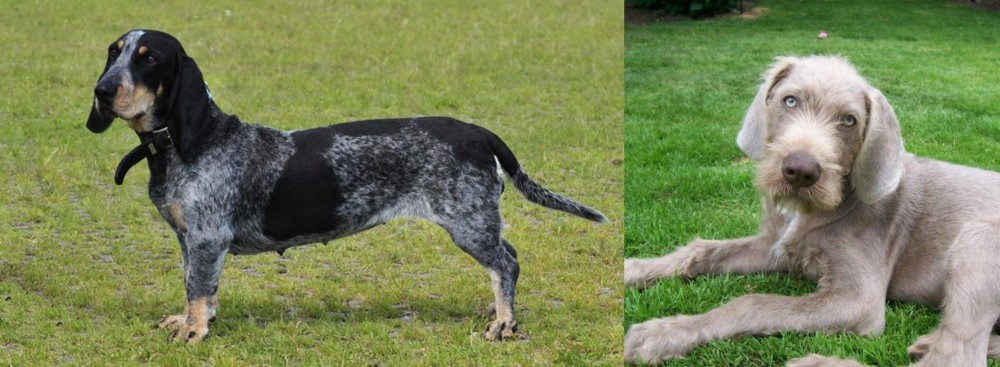 Basset Bleu de Gascogne is originated from France but Slovakian Rough Haired Pointer is originated from Slovakia. Basset Bleu de Gascogne may grow 30 cm / 11 inches shorter than Slovakian Rough Haired Pointer. Basset Bleu de Gascogne may weigh 17 kg / 37 pounds lesser than Slovakian Rough Haired Pointer. Both Basset Bleu de Gascogne and Slovakian Rough Haired Pointer has almost same life span. Both Basset Bleu de Gascogne and Slovakian Rough Haired Pointer has almost same litter size. Basset Bleu de Gascogne requires Moderate Maintenance. But Slovakian Rough Haired Pointer requires Low Maintenance
Basset Bleu de Gascogne is originated from France but Slovakian Rough Haired Pointer is originated from Slovakia. Basset Bleu de Gascogne may grow 30 cm / 11 inches shorter than Slovakian Rough Haired Pointer. Basset Bleu de Gascogne may weigh 17 kg / 37 pounds lesser than Slovakian Rough Haired Pointer. Both Basset Bleu de Gascogne and Slovakian Rough Haired Pointer has almost same life span. Both Basset Bleu de Gascogne and Slovakian Rough Haired Pointer has almost same litter size. Basset Bleu de Gascogne requires Moderate Maintenance. But Slovakian Rough Haired Pointer requires Low Maintenance
 The Basset Bleu de Gascogne is an old breed and also one of the most reserved of the Basset family. The Basset Bleu de Gascogne’s history can be traced back to the 14th century, originating in the region of Gascony, France. At one time there were very few of these dogs and Alain Bourbon began doing something about this in the early 20th century, although he didn’t document his breeding practices . There are theories though and one was that he bred a few of the very first Basset Bleu de Gascognes with the Basset Saintongeois and the Grand Bleu de Gascogne.
The Basset Bleu de Gascogne is an old breed and also one of the most reserved of the Basset family. The Basset Bleu de Gascogne’s history can be traced back to the 14th century, originating in the region of Gascony, France. At one time there were very few of these dogs and Alain Bourbon began doing something about this in the early 20th century, although he didn’t document his breeding practices . There are theories though and one was that he bred a few of the very first Basset Bleu de Gascognes with the Basset Saintongeois and the Grand Bleu de Gascogne.
Today the Basset Bleu de Gascogne is rarely found anywhere beyond France’s borders and there are only a few clubs for the Basset Bleu de Gascogne.
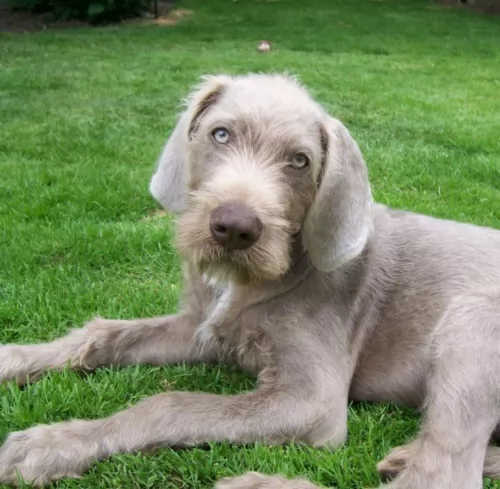 The Slovakian Rough Haired Pointer is a gundog from Slovakia. The dog came about by crossing the Cesky Fousek, German Wirehaired Pointers and Weimaraners. Other names for this dog include Slovensky Hrubosrsky Stavac.
The Slovakian Rough Haired Pointer is a gundog from Slovakia. The dog came about by crossing the Cesky Fousek, German Wirehaired Pointers and Weimaraners. Other names for this dog include Slovensky Hrubosrsky Stavac.
Developers were looking for a dog with good stamina – a dog capable of tracking hares and birds. The dog was first introduced into the United Kingdom in 1997.
 The Basset Bleu de Gascogne today is a striking looking hound, and is the most reserved o the Basset breeds. When you look at him, their general appearance is large but not too heavy. Long of build, his height at the withers is about 30 – 38cm, and he weighs up to 18kg.
The Basset Bleu de Gascogne today is a striking looking hound, and is the most reserved o the Basset breeds. When you look at him, their general appearance is large but not too heavy. Long of build, his height at the withers is about 30 – 38cm, and he weighs up to 18kg.
He has short legs, thick bones, long floppy ears and dark brown, sad eyes, but is still agile and able to get around quickly. This particular Basset has a short, smooth, dense coat which is black with a white mottled pattern and some tan marking around the feet and face. You’ll most times notice black patches over his ears and sides of his head and there will typically be a white blaze on his skull.
The attractive Basset Bleu de Gascogne is one of 6 Basset Hound breeds, and this one is an energetic, lively dog who possesses a great sense of smell. Easy to train, he slots in well with his human family, wanting to please them all the time. They just love his dark, sorrowful brown eyes and the gentle expression on his face. With his deep bark, he tries to talk to his family. He is fairly easy to train, and with socialization and training he makes an exceptional pet.
Perhaps one aspect of the Basset family that doesn’t go down well with dog owners is their wandering nature. As a scenthound, he often gets the scent of something and wants to put his nose down and follow it. If you haven’t got a sturdy wall or fence around your property, he’ll just wander off.
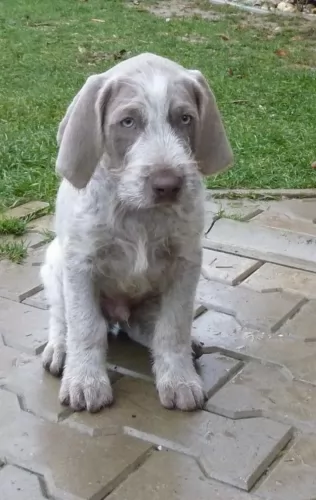 The Slovakian Rough Haired Pointer has got some looks from each of the dogs he was derived from. He is a fairly large dog and the coat is short to medium length and harsh and wiry and he has some additional hair around the face area.
The Slovakian Rough Haired Pointer has got some looks from each of the dogs he was derived from. He is a fairly large dog and the coat is short to medium length and harsh and wiry and he has some additional hair around the face area.
Most times the coat is a grey-brown shade. The ears are medium length and floppy and the tail is mostly docked at 50% of natural length, although these days it is often left long. It is carried downwards when at rest but raised when in action.
This is an energetic dog that is going to need a lot of exercise, so he won’t suit living with people who aren't active. He just loves to be outside and will thrive on a farm.
He is good with children and other dogs, but training and socialization should be provided for this dog. He is intelligent and will learn easily.
They’re affectionate dogs and their social nature makes them ideal for lively families. Because he is so active he is best suited for living in the suburbs or the countryside as opposed to living on a small property in the city.
 This smooth-coated breed with his low-set ears, his sad eyes, out-turned paws and gentle but intelligent pet make this dog an awesome, companionable pet. He is loyal, affectionate and devoted. They’re good with children and other pets, and can even make superb pets for older- or frail people who may lead a more sedentary lifestyle.
This smooth-coated breed with his low-set ears, his sad eyes, out-turned paws and gentle but intelligent pet make this dog an awesome, companionable pet. He is loyal, affectionate and devoted. They’re good with children and other pets, and can even make superb pets for older- or frail people who may lead a more sedentary lifestyle.
The Basset Bleu also sheds a bit less than their Basset Hound counterparts, although they do tend to shed throughout the year. He will require training, just like any dog really, but you don’t want to be harsh with training, as he is a gentle, sensitive dog.
Laid back, this dog which has always been an excellent hunter in days gone by, will make anyone a devoted, loyal friend.
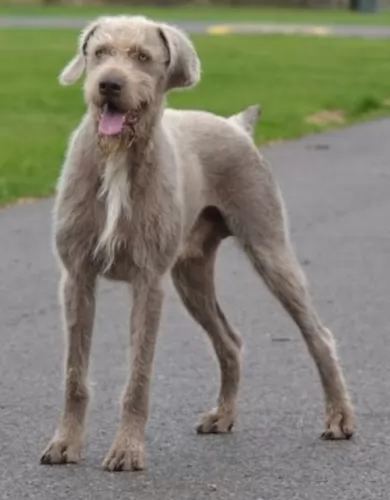 People who have owned these dogs rave about their loyalty and affection. They’re also intelligent and become very well behaved as they are dogs that also want to please their owners.
People who have owned these dogs rave about their loyalty and affection. They’re also intelligent and become very well behaved as they are dogs that also want to please their owners.
They’re gentle dogs too, just wanting to be loved by their human family and craving attention.
They’re also regarded as low maintenance pets and all these positive aspects of this dog make him a splendid choice if you're looking for a wonderful pet and companion
 A great aspect with Basset Bleus is that they have very few health issues and are quite laid back. They can easily get to 14 years of age and older with good nutrition and exercise. Nothing is set in stone however, and every breed can suddenly develop health problems.
A great aspect with Basset Bleus is that they have very few health issues and are quite laid back. They can easily get to 14 years of age and older with good nutrition and exercise. Nothing is set in stone however, and every breed can suddenly develop health problems.
Dogs like this with a deep chest can be prone to a condition known as gastric dilatation volvulus or bloat. This is a condition not to be taken lightly as it can be life threatening. Gastric dilatation volvulus means twisted stomach because of excessive gas or flatulence and your dog will require prompt treatment.
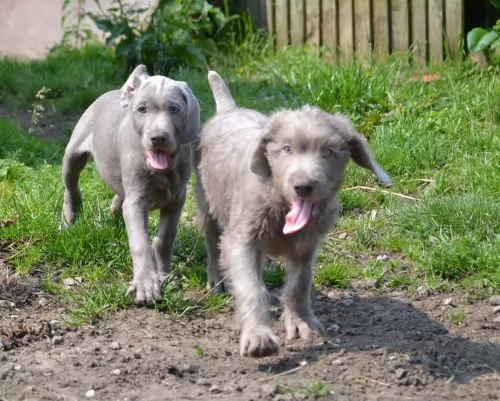 Your Slovakian Rough Haired Pointer can reach 14 or 15 years of age if he is looked after well but hip dysplasia is a threat for any dog.
Your Slovakian Rough Haired Pointer can reach 14 or 15 years of age if he is looked after well but hip dysplasia is a threat for any dog.
Any aged dog can be affected and this mobility disease is caused when the hip joint develops abnormally. Although hip dysplasia is genetic, environmental factors can also play a part. The idea is to get treatment from the vet so that your canine friend isn’t in pain.
This can cause so many problems in the body and not just the teeth. Have your dog’s teeth checked regularly and have them cleaned.
Your dog can have neck or back pain from this ailment, occurring when the discs and vertebrae of the spine become infected. Provide your dog with healthy food to ensure a strong immune system to fight off diseases like this.
 With his short coat, shedding isn’t a huge issue with the Basset Bleu. He sheds seasonally and then you will definitely have to brush him at least twice a week to get rid of all that loose hair.
With his short coat, shedding isn’t a huge issue with the Basset Bleu. He sheds seasonally and then you will definitely have to brush him at least twice a week to get rid of all that loose hair.
Some dog owners don’t get used to the slobbering of these dogs. Certainly, you will need to change his drinking water often because of this slobbering of his. It can result in the water containing viruses and bacteria which can cause infections in your dog.
These dogs tend to be lazy at home, so it will be up to you to see that he gets a good quota of exercise to prevent him becoming fat and prone to more illnesses. The backs, especially with added weight, can cause problems and this kind of dog shouldn’t be encouraged to jump off beds and couches.